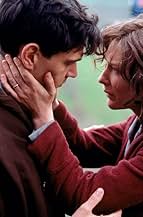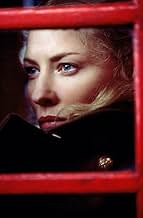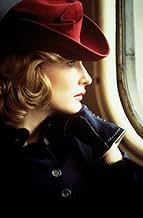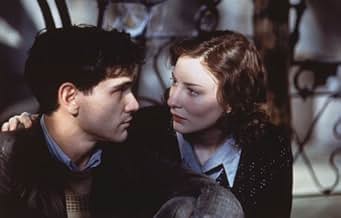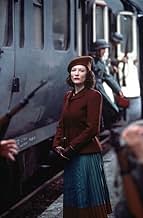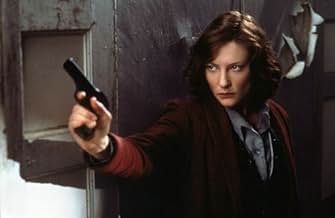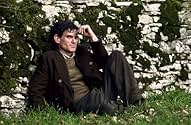IMDb-BEWERTUNG
6,4/10
13.520
IHRE BEWERTUNG
Eine junge Schottin schließt sich im Zweiten Weltkrieg dem französischen Widerstand an, um ihren über Frankreich abgeschossenen Freund zu retten.Eine junge Schottin schließt sich im Zweiten Weltkrieg dem französischen Widerstand an, um ihren über Frankreich abgeschossenen Freund zu retten.Eine junge Schottin schließt sich im Zweiten Weltkrieg dem französischen Widerstand an, um ihren über Frankreich abgeschossenen Freund zu retten.
- Regie
- Drehbuch
- Hauptbesetzung
- Auszeichnungen
- 6 Nominierungen insgesamt
Rupert Penry-Jones
- Peter Gregory
- (as Rupert Penry Jones)
Mathew Plato
- Jacob
- (as Matthew Plato)
Empfohlene Bewertungen
If nothing else, the superb cinematography makes Charlotte Grey a winner. The picture is filmed through a creative and sensitive eye with wonderful angles, evocative moods and sensitive textures and shades. The rain and snow outside the train window in the opening scenes is somehow just so right. But photography aside, this is a gripping and well acted work that will satisfy fans of both war movies and love stories. Michael Gambon gives an Oscar worthy performance. It's also so nice to see a film that does not have one of those dreadful syrupy and impractical happy endings. Not that it's a totally sad ending. Call it a bitter sweet ending. In any case this film is an absolute delight from the titles to the closing scene.
Pretty dreadful adaptation of Faulks' novel.
Gillian Armstrong presents a sanitised version of the book, with much of the meat of Charlotte Gray's relationships removed. Unfortunately the story hangs off the intensity of these relationships she has - with Cannerly and Lavade in particular who are never really given screen time to develop. The acting is pretty dull, and the actors are not really helped by the witheringly dull script. Gambon does his best with what little he is given in the role of Lavade, as does Ron Cook as Mirabel, but Crudup and Blanchett are just not firing on all cylinders. Maybe this is because the story has been so acutely edited, paring away all the extraneous parts of the story but in the end offering a sequence of events that create no tension either as a thriller or a romance.
My other gripe is the art direction. This looks like a made-for-TV drama, with the costumes and mis-en-scene looking fresh, clean and unused. This drama is based in the 1940s during a war, life was dirty and shabby. Armstrong and her production designer give us an unrealistic picture of wartime France and Britain.
Unfortunately this is really just an average British Television Period Drama.
Gillian Armstrong presents a sanitised version of the book, with much of the meat of Charlotte Gray's relationships removed. Unfortunately the story hangs off the intensity of these relationships she has - with Cannerly and Lavade in particular who are never really given screen time to develop. The acting is pretty dull, and the actors are not really helped by the witheringly dull script. Gambon does his best with what little he is given in the role of Lavade, as does Ron Cook as Mirabel, but Crudup and Blanchett are just not firing on all cylinders. Maybe this is because the story has been so acutely edited, paring away all the extraneous parts of the story but in the end offering a sequence of events that create no tension either as a thriller or a romance.
My other gripe is the art direction. This looks like a made-for-TV drama, with the costumes and mis-en-scene looking fresh, clean and unused. This drama is based in the 1940s during a war, life was dirty and shabby. Armstrong and her production designer give us an unrealistic picture of wartime France and Britain.
Unfortunately this is really just an average British Television Period Drama.
In the midst of WWII, Charlotte Gray (Cate Blanchett) falls for dashing pilot Peter Gregory. She is recruited into the secret service since she spent time in France and is fluent. When Peter is lost behind the lines, she pushes to get the courier job for the French Resistance. Only she has the ulterior motive to find her missing love. Once on french soil, she finds french communist fighter Julien Levade (Billy Crudup).
This is an utterly old fashion melodrama. That has less to do with the setting or time period. It has more to do with the style and the subject matter. The romance has no time to develop and has a very superficial manufactured old romance novel feel. Other than a pretty face, there is nothing to justify the grand romance being depicted. It would probably be more compelling to have this about a family member. Cate Blanchett is a truly wonderful actress, and any positives from this movie are all due to her. There is a sense of danger but it doesn't persist. Director Gillian Armstrong has made a beautiful movie. It just doesn't have better passion or excitement.
This is an utterly old fashion melodrama. That has less to do with the setting or time period. It has more to do with the style and the subject matter. The romance has no time to develop and has a very superficial manufactured old romance novel feel. Other than a pretty face, there is nothing to justify the grand romance being depicted. It would probably be more compelling to have this about a family member. Cate Blanchett is a truly wonderful actress, and any positives from this movie are all due to her. There is a sense of danger but it doesn't persist. Director Gillian Armstrong has made a beautiful movie. It just doesn't have better passion or excitement.
Is Cate Blanchett the best actress today? I start believing it. She just performed superbly in all the last films I saw. Almost any critic I read compares her with Meryl Streep, and no wonder - she has the interior strength and beauty that makes her shine in all roles, without being of a remarkable physical beauty.
Unfortunately, 'Charlotte Gray' cannot offer Cate Blanchett a good script to turn it in a Big movie. The story is quite un-believable, and if it has any logic it is Hollywood logic. Hard to believe an anonymous girl can train and become a spy just because she wants to search for her disappeared lover, and we never get any sense of the reasons she is being sent for. The Holocaust story is spoiled and sentimental a la Hollywood, and the characters behave without any real interior reason, just as the cliches of big studios American movies ask. Most awful is the treatment of the language. Blanchet is a Scot, lives in London, and then is sent to France because she is speaking fluent French. All the movie is spoken in English. Why? Language plays a role in the spying game, and if French was used in the scenes happening in France, much credibility could have been added.
Despite all the film is watchable, and I enjoyed every second Cate Blanchett is on screen. I am looking forward for the great movies and the Oscars to come, as she deserves.
Unfortunately, 'Charlotte Gray' cannot offer Cate Blanchett a good script to turn it in a Big movie. The story is quite un-believable, and if it has any logic it is Hollywood logic. Hard to believe an anonymous girl can train and become a spy just because she wants to search for her disappeared lover, and we never get any sense of the reasons she is being sent for. The Holocaust story is spoiled and sentimental a la Hollywood, and the characters behave without any real interior reason, just as the cliches of big studios American movies ask. Most awful is the treatment of the language. Blanchet is a Scot, lives in London, and then is sent to France because she is speaking fluent French. All the movie is spoken in English. Why? Language plays a role in the spying game, and if French was used in the scenes happening in France, much credibility could have been added.
Despite all the film is watchable, and I enjoyed every second Cate Blanchett is on screen. I am looking forward for the great movies and the Oscars to come, as she deserves.
This film is a love story, loosely based on the real-life heroism of WWII. Those who enjoy such films would not have been disappointed by Charlotte Gray.
Unfortunately, Channel 4 decided to precede the film with the transmission of a documentary about the real-life heroines, whose personal sacrifices, pragmatic courage and strength of character shone out of my TV in a way that had me close to tears. The film, which followed, showed none of the iron self-discipline, the de-sensitising effect of war nor the constant fear of discovery these people lived with, but concerned itself with emotional story lines that would have been at home in any modern love story, loosely based on any social environment you care to choose. Far from blending into the background, along with the oppressed French population, Cate Blanchett was often portrayed parading in high heels and flattering autumnal colours, looking like a million francs
Too frequently for this viewer, it dipped into the downright absurd, e.g. having a) the male lead exposing himself to danger in an astonishing, barking tirade at German troops, b) the collaborationist French schoolteacher volunteering to the goodies that he was a snitch for the Germans and c) Charlotte herself somehow persuading a gendarme not to reveal her whereabouts to his search party colleagues, even when safely out of range of her pistol.
What a wonderful piece of history it was. And what a wonderful film could have been made of it (with the same cast too; the individual performances were all perfectly OK, especially in the minor roles).
Unfortunately, Channel 4 decided to precede the film with the transmission of a documentary about the real-life heroines, whose personal sacrifices, pragmatic courage and strength of character shone out of my TV in a way that had me close to tears. The film, which followed, showed none of the iron self-discipline, the de-sensitising effect of war nor the constant fear of discovery these people lived with, but concerned itself with emotional story lines that would have been at home in any modern love story, loosely based on any social environment you care to choose. Far from blending into the background, along with the oppressed French population, Cate Blanchett was often portrayed parading in high heels and flattering autumnal colours, looking like a million francs
Too frequently for this viewer, it dipped into the downright absurd, e.g. having a) the male lead exposing himself to danger in an astonishing, barking tirade at German troops, b) the collaborationist French schoolteacher volunteering to the goodies that he was a snitch for the Germans and c) Charlotte herself somehow persuading a gendarme not to reveal her whereabouts to his search party colleagues, even when safely out of range of her pistol.
What a wonderful piece of history it was. And what a wonderful film could have been made of it (with the same cast too; the individual performances were all perfectly OK, especially in the minor roles).
Wusstest du schon
- WissenswertesThe true story of Nancy "White Mouse" Wake inspired Sebastian Faulks' 1999 novel Charlotte Gray upon which this movie was based. Australian Prime Minister Julia Gillard said Mrs. Wake was "a truly remarkable individual whose selfless valor and tenacity will never be forgotten." Born in New Zealand, but raised in Australia, she is credited with helping hundreds of Allied personnel escape from occupied France. Working as a journalist in Europe, she interviewed Adolf Hitler in Vienna in 1933 and then vowed to fight against his persecution of Jews. After the fall of France in 1940, Mrs. Wake became a French Resistance courier and later a saboteur and spy, setting up escape routes and sabotaging German installations, saving hundreds of Allied lives. She worked for British Special Operations and was parachuted into France in April 1944 before D-Day to deliver weapons to French Resistance fighters. At one point, she was top of the Gestapo's most wanted list. "Freedom is the only thing worth living for. While I was doing that work, I used to think it didn't matter if I died, because without freedom, there was no point in living", Mrs. Wake once said of her wartime exploits. It was only after the liberation of France that she learned her husband, French businessman Henri Fiocca, had been tortured and killed by the Gestapo for refusing to give her up. She was Australia's most decorated servicewoman, and one of the most decorated Allied servicewomen of World War II. France awarded her its highest honor, the Legion D'Honneur. She also received Britain's George Medal, and the U.S. Medal of Freedom. In 2004, she was made Companion of the Order of Australia. She died in London on August 8, 2011 at the age of ninety-eight.
- PatzerThe German colors during the Nazi Regime were actually Black, White and Red. These were also the colors of the N.S.D.A.P. and were present on the shield of the German helmets of the Wehrmacht and all of the flags at this time. So the Bundesrepublik Deutschland colors of Black, Red and Yellow are not appropriate for the film.
- Zitate
Psychiatrist: Of these three, which in your view is the most important: Faith, hope or love?
Charlotte Gray: Hope.
- SoundtracksBlack Eyed Susan Brown
Master performed by Phil Harris and his orchestra featuring The Three Ambassadors
By courtesy Hindsight Records
Written by Al Hoffman and Al Goodhart
Published by Keith Prowse Music Publishing Co Ltd
Top-Auswahl
Melde dich zum Bewerten an und greife auf die Watchlist für personalisierte Empfehlungen zu.
- How long is Charlotte Gray?Powered by Alexa
Details
- Erscheinungsdatum
- Herkunftsländer
- Offizieller Standort
- Sprache
- Auch bekannt als
- Charlotte Gray
- Drehorte
- Produktionsfirmen
- Weitere beteiligte Unternehmen bei IMDbPro anzeigen
Box Office
- Budget
- 20.000.000 $ (geschätzt)
- Bruttoertrag in den USA und Kanada
- 741.394 $
- Eröffnungswochenende in den USA und in Kanada
- 46.271 $
- 30. Dez. 2001
- Weltweiter Bruttoertrag
- 5.323.109 $
- Laufzeit2 Stunden 1 Minute
- Farbe
- Sound-Mix
- Seitenverhältnis
- 1.85 : 1
Zu dieser Seite beitragen
Bearbeitung vorschlagen oder fehlenden Inhalt hinzufügen

Oberste Lücke
What is the French language plot outline for Die Liebe der Charlotte Gray (2001)?
Antwort






